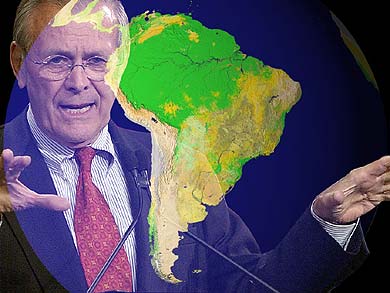
Yet another trip to Bolivar Hall in Grafton Street last night for a meeting chaired by my amigo Gordon Hutchinson of the Venezuela Information Centre (VIC), I also try to support Hands Off Venezuela as well before you ask.
A Venezuelan Communist Party MP Carolus Wimmer spoke along with Labour MP Colin Burgon. I would have been interested to hear more about the Venezuelan Communist Party relationship to the PSUV, there was an insistence that the entire left merged into one mass party. The Communist Party as far as I know are now outside the PSUV but have an amicable relationship with it.
Carolus Wimmer is also vice-President of the Parliament of Latin America and gave good account of how socialism must be built on a participatory, democratic and grassroots basis. The message that
socialism cannot be top down and statist seems to have reached Communist Parties at least in Latin America, which to me is progress.
Colin Burgon spoke well, he was scathing about Dennis McShane, a former Labour Foreign Office Minister who seemed to back the coup against Chavez in 2002:
In Britain, Dennis McShane, the foreign office minister responsible for Latin America, described Chavez in the Times of London on Saturday as a "ranting, populist demagogue" and compared him to Mussolini.
On Sunday, McShane took a more subdued approach. "Last week's coup has failed. Any change of government in Venezuela as elsewhere in Latin America and the world should come about by democratic means," he said in a statement.
Colin Burgon obviously does a great job in difficult circumstances in challenging the right wing US led Labour Party foreign policy, he made it quite clear that the US hand is firmly up the Gordon Brown puppet. It was difficult for him to answer criticism over the Iraq War during the meeting. He claimed that a Conservative Government would have even worse foreign policies than 'El gordo'.
He was clear about how the US is being defeated by the wave of socialist and social democratic governments elected in Latin America. In Ecuador one of their major bases is being shut down and the new left government in Paraguay led by a former bishop is also likely to say ‘Yankees go home’.
The present Republican administration fearing that they may lose power in November are pouring money into opposition groups in the region. The strategy seems to be to support wealthy largely white regions to split away, the autonomy card will be used to destroy Bolivia and Burgeon noted that if anti-Chavez governors win elections this year, they may go for the same strategy.
As a Green I am all for more regional self-government but it must not be a tactic to destroy progressive states or a way of the rich cutting taxes declaring themselves ‘separate’..
In Santa Cruz the anti-Morales forces essentially want independence so they can sign deals with western energy corporations. Those of us who believe in the words of Cynthia that ‘leave the oil in the soil’ combat global warming have to acknowledge that the oil barons want to extract it as quickly as possible. Natural resource control is necessary to conservation.
An interesting meeting. What we need to do is to show solidarity with the diverse but innovative Latin American left and to see how the Bolivarian process can be extended to backward parts of the world like Britain.
I certainly think we on the left over here have more to learn from Venezuela, etc than they have from us!
We should certainly be supporting the Bolivia Solidarity Campaign. Here is there take on the right wing autonomy referendum :
On May 4 the oligarchy in Santa Cruz had prepared for a big celebration. Their dictatorial and "neo-liberal" autonomy was about to be "approved" - approved, that is, by the "people of Santa Cruz". The official results were that there was a victory for the "yes" vote with 85% and only 15% for the "no" vote. The ruling elite of Santa Cruz, Bolivia's economic centre, celebrated the result all night long. But behind the fine numbers, there is another reality:
• 40% boycotted the referendum, which has been declared illegal by the country's national electoral council;
• In several rural areas the autonomous statutes were rejected completely with the burning down of the voting centres and the setting up of street committees;
• In many rural areas 70% of the electorate abstained;
• In the second largest city of the Santa Cruz department (region), Montero, 60% of the electorate abstained and 12% voted "no";
• In the poorest barrio of Santa Cruz, "Plan 3000", with 200,000 inhabitants, there were violent clashes between poor workers and the armed groups of the Fascist youth organization Union Juvenil Crucenista. They left 25 people seriously injured and one dead;
• Everywhere huge electoral fraud was reported in this referendum which was not supervised by any international observers;
• In the remaining nine departments of the country there were giant Cabildos [assemblies] and demonstrations against the Santa Cruz oligarchy. In El Alto there were half a million on the streets. In La Paz there were more than 100,000. In Cochabamba also half a million, and in many other cities there were similar mass demonstrations - including in the two mining cities, Potosí and Oruro.


No comments:
Post a Comment